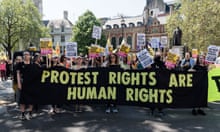Huge numbers of older voters could be disenfranchised at local elections in May after official data has shown that only 505 people aged 75-plus have applied for free voter identification documents in the month since the scheme launched.
Statistics for the numbers who have applied since the system opened on 16 January also showed that fewer than 6% of those seeking the document were aged under 25, another group seen as disproportionately likely to lack the necessary ID.
The data on applications for so-called voter authority certificates reinforces concerns that the first full rollout of the law obliging voters to show photographic identification at polling stations in England on 4 May could prove chaotic and lead to many people being turned away.
Angela Rayner said the statistics indicated the voter ID scheme would “lock people out of democracy”. The deputy Labour leader said: “This shocking data lifts the lid on the damaging impact the policy could have for marginalised voters.”
A running total on a government website showed that as of the end of Sunday, just under 21,000 applications had been submitted in total, only 1% of the estimated 2 million voters who do not possess the necessary documents already.
Just 2.4% of these were from voters aged 75 or older, 505 in total, despite this demographic being among the least likely to possess a passport or driving licence – although several older people’s travel cards will also be accepted.
Only 1,237 people aged under 25 had applied. Younger people are also less likely to have photo ID that can be used to vote, especially as the government has decided that student cards and young people’s travel passes are not valid.
The data only covers online applications to a central portal, which are then passed on to councils. People can also apply by post or in person, although one source said the total number of these was seemingly only in the hundreds.
The low take-up, averaging around 500 applications per day, comes despite the Electoral Commission running a major advertising campaign last month to inform people about the new rules.
The commission previously wrote to the government saying the timetable meant the local elections could not be conducted in a “fully secure, accessible and workable” manner.
Caroline Abrahams, the charity director at Age UK, said the charity was concerned at the implementation of voter ID, and that more than 3 million over-65s had no access to the internet, so could not apply online.
She said: “There is little time before the May elections and it’s essential that local authorities widely advertise the certificate and make sure that offline guidance and support is available for those who don’t use the internet and want to make an application.”
Nehaal Bajwa from the National Union of Students said the new rules “threaten to disenfranchise millions of people, despite hardly any evidence of a need for such steps to be taken”.
after newsletter promotion
She said: “Young people, including many students and apprentices, risk being excluded from voting almost entirely, robbing them of just one important opportunity to hold their government accountable.”
Under the Elections Act, passed last year, people must present photo ID from a small list of acceptable documents to vote in person across the UK at all future general elections and parliamentary byelections, and for local elections in England, and police and crime commissioner elections in England and Wales.
It is intended to prevent voter impersonation, despite statistics showing this is a hugely rare offence.
Northern Ireland has a longstanding voter ID system, introduced owing to historical electoral abuse by sectarian groups.
A government spokesperson said it was expected that more people would apply as the election neared.
They said: “The vast majority of people already have a form of acceptable identification and we are actively supporting the very small proportion of people who may not. We are also funding the necessary equipment and staffing to support processing.”









